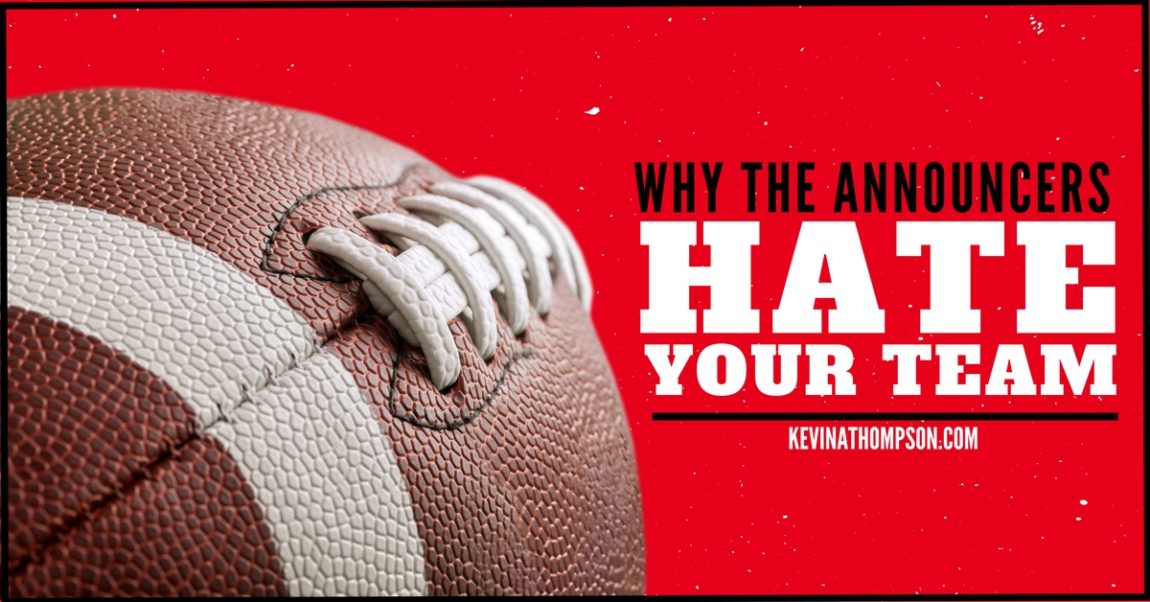“These announcers are so biased.”
“Why can’t they say anything good about our team?”
“They can’t even hide how much they are cheering for the other team.”
During the season, social media is filled with statements like this. While I’m watching my favorite team, my friends take to Facebook or Twitter to voice their displeasure of the announcers. They are tired of hearing the bias from the announcers against our team.
But why does this happen? In a day with so many people desiring to be a broadcaster, why are they so biased? And why are they always biased against my team?
The answer is simple, but difficult to believe.
The announcers are not biased.
That’s right. No matter how much you think they are, they aren’t. No matter how mad you get, they aren’t trying to provoke you.
The announcers are simply doing their job. With varying levels of skill, they are attempting to be as entertaining as possible. While they likely do prefer one team over another, they are much more likely hoping for a close game than a particular outcome. (See: Never Hire, or Marry, Someone Who Blames the Umpire)
But it doesn’t feel that way. It truly feels as though the announcers are taking sides. Why? If they sound biased, how can I so confidently say they aren’t?
Two Reasons We Hear Bias
1. We love to play the victim. From the time we are two, humanity loves to play the victim card. We cry foul. We say people are out to get us. We blame our failures on others. We never fully grow out of the tendency. Anytime we can make an excuse, we will do so. Rarely does a fan complain about biased announcing when their team is blowing out the opponent. Instead, watch as your team goes from winning to losing. The complaints of bias will greatly increase. Because we don’t like what is going on, we will find something or someone to blame. Announcers are easy targets.
2. We fail to recognize our bias. Ironically, it’s our bias, not theirs, which defines the average sports broadcast. Our love for our team influences how we listen. We are quick to assume others don’t like us, especially if we consider them an outsider. So we can listen to a broadcast from our favorite team and because we know the announcers, we don’t take their words as an act. National announcers or the opposing teams broadcasts can give the same commentary, but we assume they are out to get us. (Example: The announcer says “It’s a bad pass.” If it’s a hometown announcer, we think the pass was bad. If it’s an announcer not with our team, we think they are biased against us.)
Blaming an announcer (or official) is funny in sports. Blaming others is not so funny in life. Our tendency to hear bias when it’s not present should give us great pause. (See: What Anger Often Reveals)
Their Bias Shows Your Bias
In most cases, thinking someone else is biased simply reveals our own bias. Chances are a commentator isn’t against us or the referee isn’t out to get us. Far more likely, our desire to win is clouding our sight, hearing, and judgment.
What we think we see and hear is not always what is actually happening or being said. Far too often, we assume our perspective is the only perspective and is always the right perspective. It’s not. We are all deeply biased by our:
- past
- upbringing
- loves
- hates
- frustrations
- current emotions
We can’t escape these biases, but we can recognize them. We can realize how prone we are to seeing only part of the action or hearing something which wasn’t said or jumping to the wrong conclusions. By recognizing our biases, we can take a step back and question our judgments.
- Why would a professional communicator risk his career to cheer against our team?
- Why would an official hurt his reputation to intentionally make a bad call against us?
- Why would a coach field a team with less of a chance to win just to injure our child?
In most cases, they won’t. More often than not, where we see bias against us, it’s not there. That doesn’t mean every announcer loves our teams and every coach is thrilled to coach your child. It does mean, their personal pride and desire for success probably outweighs anything they could feel about us. Thinking others are out to get us may be one of the most prideful beliefs we can have. For most people, we aren’t nearly important enough for them to risk their well-being to be thinking about us. (See: I’m Not a Psychic, Your Anger Is Telling)
The announcers don’t hate your team. They are simply doing their job (maybe not very well) and our personal bias is skewing what they are saying. Instead of blaming them, recognize your frustrations with the announcers are more likely signs of anger that the game isn’t going the way you had hoped.




9 Responses to Why the Announcers Hate Your Team